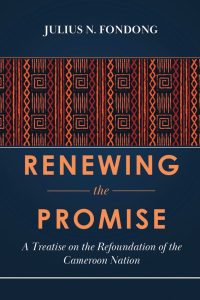Publisher: Langaa RPCIG, Cameroon
Pages: 596
Year: 2011
Category: Essays & Opinion, Leadership, Politics
Dimensions: 229 x 152 mm
Lessons Learned and the Uncertain Future
This book presents a series of reflections by Cameroon scholars on a variety of topics associated with regional balance and national integration. The different reflections look for answers to some burning questions of the day such as: Where are we coming from? Where are we going? How are we going where we are going? Have the different state ideologies offered appropriate solutions to the quest for a strong, united, stable and prosperous nation-state? If not, what has gone wrong and why? What can be done to shape the future and accommodate the aspirations of the men and women of Cameroon and of their progeny?
The book addresses the issue of national unity and national integration within the context of different political perceptions and visions. It examines the merits and demerits of the policy of regional balance of the Ahmadou Ahidjo years (1960-1982). Focus is also on the underlying flaws of this doctrine and philosophy. The debate also addresses some critical questions of the national integration policy and practices of Paul Biya, President since November 1982. The policy has failed to achieve its stated goals and has ended up in the ethnicisation and polarisation of national life. The future of the Cameroon nation-state, with its rich ethnic and cultural diversity, seems to be in jeopardy as internal forces question the management of civil society by leaders who have lost the sense of justice and equity. Why are there several voices singing the song of destitution and disappointment with the state? Have regionalism and the rhetoric of national integration and balance emerged as untenable polities within a nation-state in search of an identity and responsible leadership? These are some of the questions and issues Cameroonian and Cameroonist scholars have tried to address in this collection of 28 well-researched and outstandingly argued essays.
£75.00
About the editors
Paul N. Nkwi is currently Deputy Vice Chancellor of the Catholic University of Cameroon, Bamenda, following his retirement as Professor of Anthropology at the University of Yaounde 1, Cameroon.
Francis B. Nyamnjoh joined the University of Cape Town in August 2009 as Professor of Social Anthropology from the Council for the Development of Social Science Research in Africa (CODESRIA), Dakar, Senegal, where he served as Head of Publications from July 2003 to July 2009. He has taught sociology, anthropology and communication studies at universities in Cameroon and Botswana, and has researched and written extensively on Cameroon and Botswana. In October 2012 he received a University of Cape Town Excellence Award for “Exceptional Contribution as a Professor in the Faculty of Humanities”. He is recipient of the “ASU African Hero 2013” annual award by the African Students Union, Ohio University, USA. He is: a B1 rated Professor and Researcher by the South African National Research Foundation (NRF); a Fellow of the Cameroon Academy of Science since August 2011; a fellow of the African Academy of Science since December 2014; a fellow of the Academy of Science of South Africa since 2016; and Chair of the Editorial Board of the South African Human Sciences Research Council (HSRC) Press since January 2011. His scholarly books include: Africa’s Media, Democracy and the Politics of Belonging (2005); Insiders and Outsiders: Citizenship and Xenophobia in Contemporary Southern Africa (2006); “C’est l’homme qui fait l’homme”: Cul-de-Sac Ubuntu-ism in Côte d’Ivoire (2015); and #RhodesMustFall: Nibbling at Resilient Colonialism in South Africa (2016).

